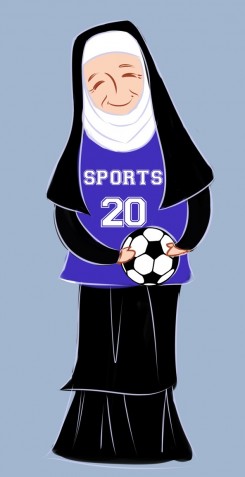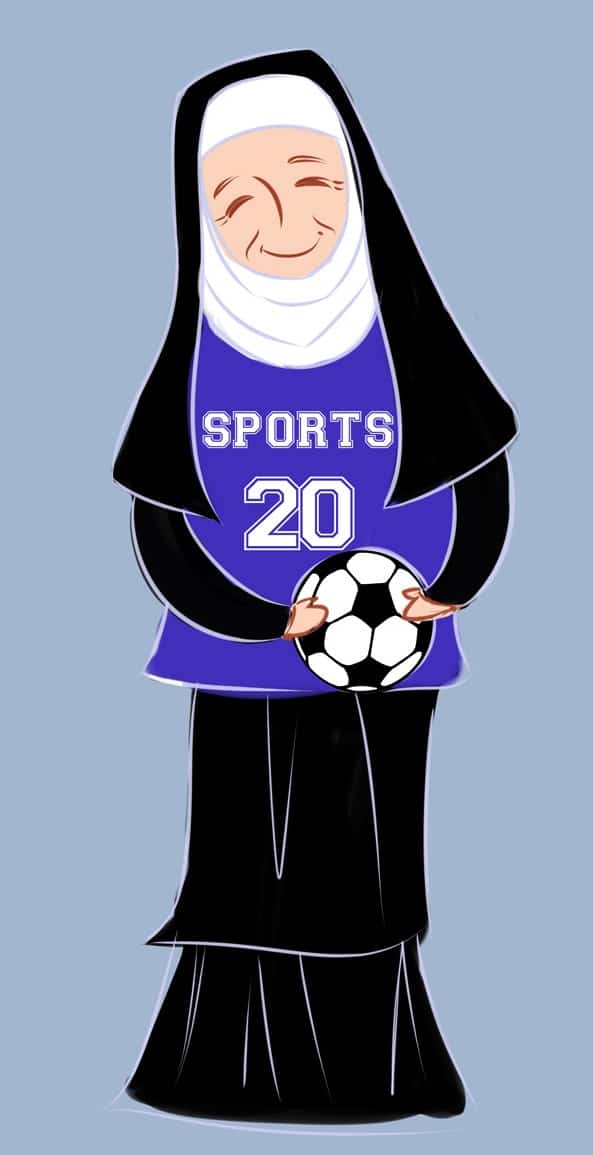In the 1992 film A League of Their Own, Jimmy Dugan prayed to God in a pre-game talk with the Rockford Peaches: “May our feet be swift; may our bats be mighty.” Although the prayer piqued confusion from the players, and laughter from the film’s spectators, it reflects a connection that is prominent in the world of sports: its connection with religion.

NANCY JI/THE VARSITY
A trend has been growing where athletes will start off their victory speeches by thanking their respective deities before thanking teammates, coaches, the organization, and of course, “the [winning team]’s fans: the greatest fans in the world.”
Charlotte Marcotte-Toale, a member of the Varsity Blues cross country team and member of the Christian athletic organization Athletes in Action, stated that: “The gift of God’s love in Jesus allows a student or an athlete to perform out of an identity of love that they didn’t earn, and that isn’t going to change, which frees them from worries, insecurities, fears, and doubts.”
Marcotte-Toale, like many other athletes, relies on religion to continue competing in her sport with the highest amount of effort that she can possibly exert. She believes that university athletes and professional athletes often use religion as motivation to compete, to continue to compete, and to “compete with heart and soul.”
Beyond the direct influence of religion on athletes, however, other connections can be drawn between the two traditions. One possibility is the experience of inexplicable sensations brought about by religion, and similar sensations prompted by events and moments in sports.
In New York University President John Sexton, Peter J. Schwartz, and Thomas Oliphant’s book Baseball as a Road to God, the writers explore experiential connections found between baseball and religion through chapters discussing such topics as miracles, faith, and doubt.
One prominent theme discussed in the book is a type of experience shared between religion and sports, the ineffable: “It’s really our moments in life that analysis and cognition can’t capture,” explained Schwartz.
Just as the enlightenment and lessons that come with religion may cause this sensation, so too may success in sports. When Don Larsen pitched a perfect game in game 5 of the 1956 World Series, the Yankees and their fans were undoubtedly overcome with a feeling unlike any other — a combination of joy, relief, and the inexplicable.
With these shared ineffable feelings also brings a coming-together of fans and players alike. This unification of people in a community is one major theme promoted by most religions, and is seen in the confluence of sports fans on municipal, national, and international levels.
“There’s something that a community identifies with in a sports team in a manner probably more closely than other aspects of civic life,” posited Schwartz.
On a daily basis, fans wearing a team’s colours or logo will exchange nods on the street, and will cheer in unison in the stands of a stadium or arena. Beyond these traditions, sports have the power to unite a more substantial group of people and provide them with feelings of security and comfort.
In 2009, the New Orleans Saints appeared in and won their first Super Bowl Championship. In the summer of 2005, Hurricane Katrina rushed through and destroyed much of their city, killing many of its citizens, and leaving many homeless. During the storm, the Louisiana Superdome, where the Saints play, provided shelter for over 26,000 people.
When the Saints won the Super Bowl, fans of the Saints, citizens of New Orleans, and those watching across the globe were united by joy for the team and its ability to overcome the effects of the tragedy and bring something to be proud of to their city.
The feeling of community that arose from this championship victory was on a monumental scale, similar to religion’s ability to bind together millions of people around a common cause.
“There’s an ability to unite about a common cause, and sports seems to be a medium where that seems to be more acute than other aspects of life,” added Schwartz.
Peter Schwartz will be giving a talk on November 20 at 7:30PM at 1700 Bathurst Street in the Hurwich Boardroom as part of a series of talks entitled “Jews in Sports.”


